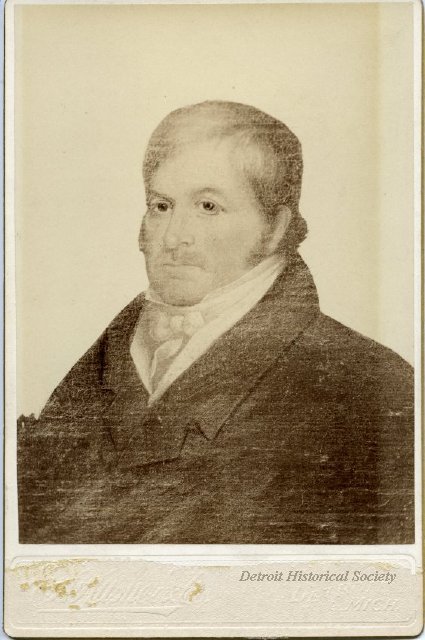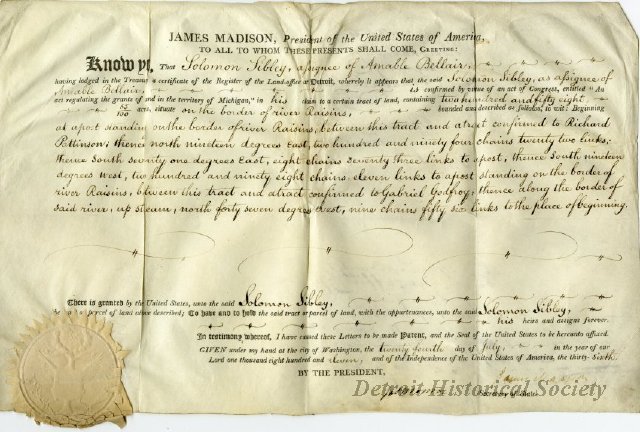Solomon Sibley was an important public figure during the formative years of Detroit and the Michigan Territory. Throughout his long career, Sibley held many prestigious political and judicial positions and was a highly influential figure involved in shaping the laws and institutions of the city, territory, and the young state.
Sibley was born on October 7, 1769 in Sutton, Massachusetts. He attended the College of Rhode Island, and studied law, being admitted to the bar in 1795. Sibley opened a law office in Marietta, Ohio, but his work soon brought him to the frontier town of Detroit where he settled in 1797, a year after the British had finally withdrawn. Sibley married Sarah Whipple Sproat and the couple had eight children, including noted army officer Ebenezer Sproat Sibley and Minnesota governor Henry Hastings Sibley. The 1848 Sibley home, completed after his death, still stands on Jefferson Avenue today, one of the oldest homes in Detroit.
As one of only two lawyers in the city, Sibley attended court as far away as Cincinnati and Chillicothe, Ohio. Although young, Sibley became a well-respected citizen in Detroit, and in 1799 was elected to the legislature of the Northwest Territories as a representative of Wayne County. Sibley was very active in the territorial government and was instrumental in introducing and passing legislation which incorporated Detroit as a city. As a result of his involvement, Sibley was elected to the city’s Board of Trustees while serving out his term in the territorial legislature.
In 1806, Sibley authored Detroit’s first city charter and was appointed first mayor of Detroit by the governor. Governor William Hull and Chief Justice Augustus Woodward, as part of the territorial government, had control of the city, so Sibley, after seeing to the election of a council, resigned to focus on other endeavors.
Following the War of 1812 during which he commanded a company of militiamen and helped defend the city during the British invasion, Sibley was appointed auditor for the Michigan Territory, serving from 1814 until 1817. Sibley also helped raise funds for the founding of the University of Michigan.
In 1815, President Madison appointed Sibley as the first U.S. federal attorney for the Michigan Territory, a post he would hold until 1823. He was elected as territorial delegate to the United States Congress, filling a vacancy left by the resignation of William Woodbridge, and reelected to a second term.
Around this time Sibley and his wife bought and operated a saw mill in Pontiac, aiding in the establishment of the growing village, and built a cabin there that exists today as part of the Sibley-Hoyt house. In 1823 Sibley bought a limestone quarry in a village named for him, that was later annexed by Trenton.
Also in 1823, he was appointed chief justice for the Supreme Court of the Michigan Territory by President Monroe, serving from 1827 until his retirement in 1837. Sibley was extremely influential in setting the legal precedent that would enable Michigan to become a state in 1837.
After retiring from the court, Sibley lived out the remainder of his days in Detroit, dying on April 4, 1846 at age 77. Held in high esteem by his contemporaries, as well as by the public at large, his death was a state-wide observance. All members of the Michigan Bar wore black arm bands for a month to commemorate his death and his role in the development of Michigan and Detroit.
He is buried in Detroit’s Elmwood Cemetery and his papers are held by the Burton Historical Collection of the Detroit Public Library.

